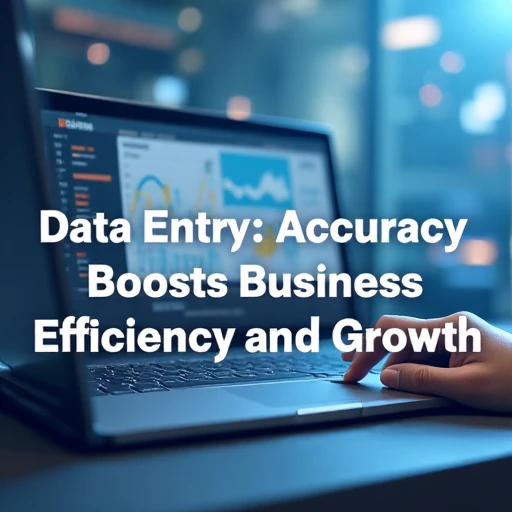Why Accurate Data Entry is Crucial for Business Growth
In today’s data-driven world, businesses rely on information to make strategic decisions, optimize operations, and deliver exceptional customer experiences. However, poor data quality costs companies an average of $12.9 million annually (Gartner). Accurate data entry isn’t just a mundane task—it’s the backbone of business growth. From avoiding costly errors to fueling smarter strategies, here’s why precision in data management matters.
Understanding Data Entry and Its Importance
What is Data Entry?
Data entry involves inputting, updating, or managing information in digital systems, such as CRM platforms, spreadsheets, or databases. Examples include:
- Recording customer details (names, contact info, purchase history).
- Logging inventory levels or financial transactions.
- Updating sales leads or marketing campaign metrics.
Why Businesses Rely on Data Accuracy
Accurate data ensures every department—from finance to marketing—operates with reliable insights. For instance, a shipping company using incorrect addresses due to typos risks delayed deliveries, customer dissatisfaction, and reputational damage.
Common Mistakes in Data Entry and Their Impact
Typing Errors and Misinformation
A single misplaced digit in a pricing spreadsheet can lead to underpricing products, slashing profit margins. Similarly, misspelled email addresses in a marketing list waste resources and lower campaign ROI.
Duplicate or Incomplete Data
Duplicate client entries in a CRM can result in redundant outreach, annoying customers. Incomplete data, like missing phone numbers, hampers sales teams from closing deals efficiently.
Poor Data Management Leading to Business Loss
A retail company once lost $2 million due to inventory mismanagement caused by outdated data. Without real-time updates, they overstocked unpopular items and ran out of bestsellers.
Benefits of Accurate Data Entry for Businesses
Improves Decision-Making and Business Strategy
Reliable data helps leaders identify trends, forecast demand, and allocate resources effectively. For example, accurate sales data can reveal seasonal spikes, guiding inventory planning.
Enhances Customer Relationship Management (CRM)
Clean data enables personalized marketing. A study by Salesforce found 52% of customers expect personalized offers. Accurate purchase histories let businesses tailor recommendations, boosting loyalty.
Saves Time and Reduces Operational Costs
Automating data entry with tools like Airtable minimizes manual errors, freeing teams to focus on high-value tasks. Fixing errors post-entry can cost 10x more than preventing them upfront.
How to Ensure Accurate Data Entry
Using the Right Data Entry Tools and Software
Tools like Zapier automate data transfers between apps, reducing human error. Explore our guide on Top Data Entry Best Practices for more tips.
Training Employees for Better Accuracy
Regular workshops on attention to detail and software use foster a culture of precision. Certifications in tools like Excel or Salesforce add value.
Outsourcing vs. In-House Data Entry: What’s Best?
Small businesses may benefit from outsourcing to specialized agencies, ensuring accuracy without hiring full-time staff. Larger enterprises might prefer in-house control.
Top Tools to Improve Data Entry Accuracy
- Airtable: Combines spreadsheets with databases for organized, collaborative data management.
- Typeform: Ensures clean data collection through user-friendly forms.
- QuickBooks: Automates financial data entry and reduces accounting errors.
FAQs About Data Entry Accuracy
How can I reduce errors in data entry?
Use validation tools and double-check entries with peer reviews.
What are the best tools for managing data entry?
Airtable, Google Sheets, and Zapier streamline processes.
Is outsourcing data entry a good idea for small businesses?
Yes—outsourcing saves time and ensures expertise, letting you focus on core operations.
Conclusion
Accurate data entry isn’t optional—it’s a catalyst for efficiency, customer satisfaction, and growth. By investing in the right tools, training, and processes, businesses can turn data into their most valuable asset. Audit your data practices today, and watch your decision-making—and profits—soar.

